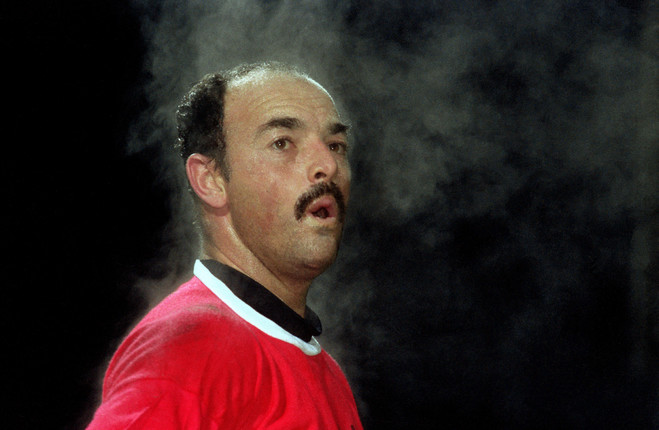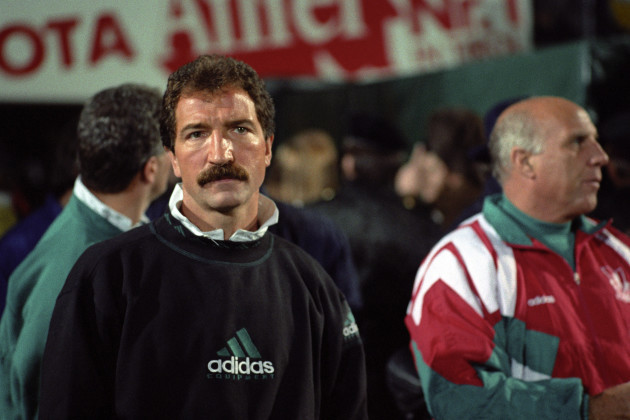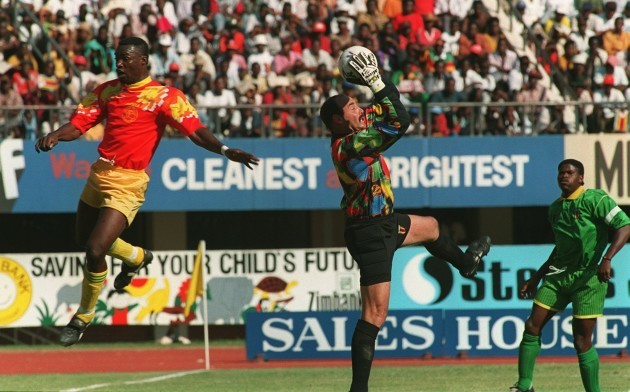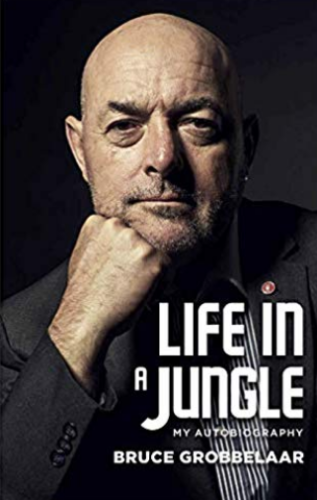THE FOLLOWING PASSAGE is an extract from ‘Life in a Jungle’ by Bruce Grobbelaar and Ragnhild Lund Ansnes.
At the end of his troubled first season, Souness called me in for a meeting.
‘Bruce, I want you to be the number one,’ he told me.
‘You want me to have the number-one jersey?’
‘Yes, you can keep the number-one jersey; but I’m bringing in a young
goalkeeper from Watford, David James, and I think that you should teach him how
to be a Liverpool keeper.’
‘I get to start the season?’
‘Yes, you get to start the season.’
The 1992/93 campaign started of with us playing in the Charity Shield against Leeds United. This could have been my last trophy but Eric Cantona, then still a Leeds centre-forward, was on fire, scoring a hat-trick in a game they won 4–3. David James was on the bench.
Our scheduled opening game in the new Premier League was against Nottingham Forest on 15 August 1992 at the City Ground. Earlier that year the Premier League had been created to maximise television revenue from the burgeoning satellite TV technologies, but the side efect was changing dates on the fixture list to be able to broadcast more games live.
While the money would flow into the game in the years and decades that followed, unfortunately it was the beginning of the end of football as a game played at three o’clock on Saturday afternoons. Ours was just the first of thousands of matches that would be moved over the years to accommodate TV.
The Premier League put the game back 24 hours to Sunday 16 August. For me, this was a big problem. Zimbabwe were playing against South Africa on that Sunday in the Africa Cup of Nations, and it was a very historical game as it was South Africa’s very first competitive fixture back in world football after the end of apartheid.
With the release of Nelson Mandela from prison and democratic elections, FIFA had finally lifted their long-standing ban. Obviously I wanted to play in a game of such significance, and I had got a plan worked out: after the Liverpool game a helicopter was going to take me from the Midlands to Gatwick and I was going to get the Air Zimbabwe flight to Harare.
For me, there was an additional incentive. By playing in this game, I was ofered the opportunity to get my Zimbabwean passport back. It had been taken away from me after I published my first book, More Than Somewhat, in 1985 when I called the freedom fighters in the Bush War ‘guerillas’ rather than ‘freedom fighters’.
Robert Mugabe hadn’t liked that, and as a result confiscated my Zimbabwean passport, since when I’d travelled around on my South African passport. However, the Zimbabwean authorities had been concerned that with the return of South Africa to international football I would go and play for the country of my birth not realising the rules in place then that if you had played for one country, you could not then play for another country later.
I was ready for the match and ready to get my passport back and then they went and changed the Liverpool game to the Sunday. There was only one game in which I planned on playing, and it wasn’t at the City Ground.
The week before the Forest game, Souness came to me and said, ‘What are you going to do about Zimbabwe? Our fixture has been changed to Sunday.’
I replied, ‘I know that you’ve asked me to be number one, I am sorry, but I am going back to play for my country.’
‘I thought you said you wanted to start?’
‘Yes, I would have started if we’d played on the Saturday, and I would have flown over to play the game on the Sunday, but they changed it, and now I’m going to play my game in Zimbabwe, and play with the national team.’
This went down like a lead balloon. 15 years after walking away from the Bush War, I found myself at the heart of a new conflict: between Graeme Souness and myself. Since I was missing the Forest game I left for Zimbabwe on the Tuesday after the Charity Shield.
I trained with my country on Wednesday and Thursday. My Zimbabwean passport, however, had still not been returned. Without it, I wouldn’t be allowed to play. Friday came and there was more training, but still no documents and it was becoming a concern. Had I come all this way for no reason?
Finally, on Saturday, with FIFA’s match commissioner due to inspect our documentation, the passport finally arrived. At last I was ready to play for my country again.
Peter Ndlovu scored twice as we beat South Africa 4–1. It was a big, big game for us. Nowadays you can’t really picture English football colliding with international duty, but back then different confederations adhered to different calendars and their international breaks didn’t always fall into line with those in other confederations.
Though the Africa Cup of Nations has always been in winter — and it wasn’t a competition Zimbabwe qualified for always anyway — friendlies and qualifying matches in Africa, for example, were consistently played in different weeks to those in Europe, sometimes at random.
It was only later that FIFA brought some unity to the international calendar. Moreover, back then clubs had first call on their players, which really meant that I was taking a stand against Liverpool.
Souness didn’t like that I missed the Liverpool game one little bit. Choosing my country over Liverpool in this game was the start of a war with my manager. They lost 1–0 in the opening game and I took the blame, despite being more than 6,000 miles away.
Instead I was a spectator for the following 10 matches. David James played but he was not a success. He conceded 20 goals in his first eleven appearances, including four at Aston Villa and four against Chesterfield in the League Cup at Anfield.
After the Chesterfield debacle Souness put me back in goal again, but it was short-lived. I played another eight games, but then he dropped me again, with David James and then Mike Hooper taking my place.
It did bug me, as I knew clearly that I had more experience and was a better goalkeeper than either, but I was still left out of the team. David James had all the attributes to become a fantastic goalkeeper but plunging him into the side at that time when the team was in transition was not the right decision.
The Liverpool goalkeeper position is a tricky one to adjust to at the best of times. My absence from the first team was my punishment for choosing Zimbabwe over Liverpool. I questioned it, but who’s to question the boss?
Souness thought that James was better than me at the time until he found out that we were languishing somewhere in mid-table. And when I played we started going up; and then I went back to play for my country again and he didn’t like it, so out I went again into another spell in the cold. It was in and out.
At that time he had three goalkeepers and he was juggling. Mike Hooper was respectful; he knew his limits. David James didn’t know his limits, and got the nickname ‘Calamity James’ from the fans.
Had James had the right experience in front of him maybe his path would have been diferent. Instead, Liverpool’s defence was changing constantly as well and this meant there was nobody there with the sort of authority to instill the discipline that was needed to round his game of.
On reflection, I have some sympathy for him because without Hansen and Lawrenson and then a team of winners in midfield and attack, maybe I wouldn’t have survived when I started out.
Ultimately, it takes a smart manager to understand you don’t change too much too soon, otherwise it becomes very difficult for players to settle and blend.
I also had my chances to leave, but bizarrely Souness put paid to that as well.
Just after the start of the 1992/93 campaign, and shortly after losing my place in the team, I got an offer to go to Chelsea.
At Melwood one morning Souness came and said, ‘Ken Bates would like to see you down in Chelsea. I’ve agreed a figure for you for £650,000.’
This was huge. I was nearly 35 at this stage, and goalkeepers rarely commanded such big fees anyway. I caught the train down, got picked up by someone at Chelsea and was taken straight to the chairman Ken Bates’s office.
Bates didn’t waste any time laying down an offer: they would triple my wages, give me a great signing-on fee, as well as a house near their training ground.
‘Mr Bates,’ I told him, ‘it’s a great offer, but I’m going to have to talk it over with my wife.’
When I went back to Anfield and into training the following day Souness asked me how it went and if we had agreed on anything.
‘I haven’t agreed anything; I will let him know when I’ve had a discussion with my family and what we want,’ I told him.
‘Well, if you agree to go, the fee for Chelsea is going to change.’
‘What do you mean?’
I don’t know what was going through his mind or what was going to happen to the rest of the fee, but I didn’t go to Chelsea.
It was a very generous offer towards the end of my career. It would have been a good move to go to Chelsea in the 1992/93 season, especially since I was stuck with a manager that didn’t want me and I would have played a lot longer in the Premier League.
I never got bitter about the deal not going through. On cold reflection, after everything that had happened at Heysel, I wouldn’t have liked to go to a team where I knew National Front members formed part of the club’s support.
‘Life in a Jungle’ by Bruce Grobbelaar and Ragnhild Lund Ansnes is published by deCoubertin Books. More info here.
Subscribe to our new podcast, Heineken Rugby Weekly on The42, here:




